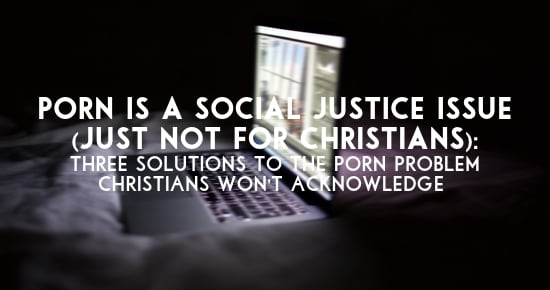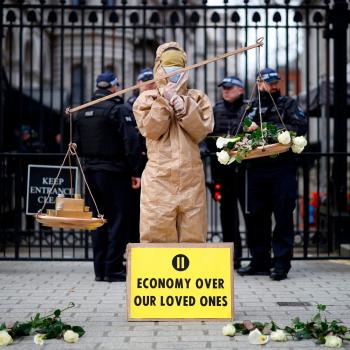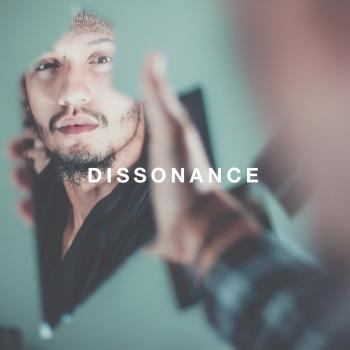The other day Relevant Magazine posted an article titled “Porn is a Social Justice Issue.” It was well written making it an easy and enjoyable read, but as I was reading through the article it felt as if much of the data was slanted with a subversively subtle undertone of shaming the reader. I’m not sure if it was intentional, and I’m sure it wasn’t. Many of us as Christians, as I’ve discovered, don’t have morals so much as we have created our own set of rules and laws in which one must abide to and by in order to remain a part of their community.
Regardless of this article, I’ve seen in far too many churches the underlying culture of moralism leveraging and misusing statistics regarding two separate issues that have some overlapping similarities (e.g. porn and sex trafficking) as a means of guilting, controlling and manipulating the people. For instance, the author states that “the porn industry is tightly intertwined with the industry of sex trafficking,” she goes on to cite some research stating that “According to Laura Lederer of the Protection Project and Global Centurion, an anti-trafficking organization, over 25 percent of child sex traffickers take pictures or video recordings.”
I don’t doubt this is true, but what this subversive language and misuse of research suggests (without the reader consciously realizing it) is that the mainstream porn the average person is viewing consists of young trafficked sex slaves; this suggestion, intended or not, would be wrong, in the sense that it’s baseless and this research is not stating this.
It’s all too convenient for the conservative-agenda to ignore the fact that trafficking and exploitation (to this extent) is aberration not the norm.
“Should We Feel Shame for Viewing Pornography?“
Of course, there are terrible individual stories of “forced participation” within the porn and, even, the prostitution industry. There’s also forced participation within every other major industry known to man (e.g. the fast food industry, the clothing/fashion industry, the RELIGIOUS industry etc.). Both need to be acknowledged and addressed. I’m just not so sure shaming Christians by convincing them they are unjust chronic masturbators inadvertently supporting sex trafficking is the best, healthiest, or most constructive means of creating a just and Christlike world.
(this is where the Christian, pastor, and/or author of this post will chime in and say, “Well, this is not my intention…” but, it’s what’s happening – speaking of research, it also shows that shaming, intentional or not, is an ineffective means of properly motivating people to behavioral modification.)
Christians make it about the “immoral” act of viewing images of sexually explicit material, as opposed to caring about the individuals inflicted by their injustice. We have gotten it backwards; viewing porn is not the problem so much as our neglect of the individuals inflicted by our falsified morality that’s lead to the complete neglect of their humanity, that is the problem.
“We are workers, not victims,” Lily Hermarratanarapong
People are not inflicted by our sexual drive so much as they are inflicted by a world that is broken. Your sexual drive is not what makes you broken; the system in which creates the need for humans to be subjected to exploitation (pornographic or not), that is what makes our world broken.
I’ve spoken a bit about this topic here, but in light of continually wanting to be constructive I wanted to provide three solutions to the problem of porn in which I feel our current mainstream Christian “theology” won’t allow us to quite fully recognize (after reading through these you’ll see why):
- Decriminalize prostitution – Remember just because we as Christians don’t agree with a life style doesn’t (always) mean we should stop them. Especially if stopping them is creating more societal harm than it is creating good. Decriminalizing prostitution is just a means of beginning the process of making prostitution a safer means of working and earning a living. It would allow the state to implement and monitor safety precautions, lessening the risk of STD transmission, rape, exploitation, and abuse.
- Stop Slut-shaming innocent bystanders – Shame comes in more than one form. Shame goes beyond just hurling empty but viscerally charged insults at women; there is a felt energy conveyed when someone pities another. Sex workers (e.g. prostitutes, porn stars, etc.) have been amidst those on the receiving end of these felt shame. “We are workers, not victims,” Lily Hermarratanarapong (https://www.vice.com/read/blow-jobs-are-real-jobs-v23n1). The Christian epistemology has unfortunately created a culture that imposes a sense of pity on all others who don’t abide to their theology. It’s a shame (pun intended).
- Raise the minimum wage. Help the unionization of sex workers. Offer universal health care and education – MLK was for this. It will stop impoverishment, in which perpetuates the imposition of forced prostitution. – This goes alongside the decriminalization of prostitution, if the goal is to lessen the amount of exploitation decriminalization will stop this.
I want to respect and empathize with the Christian ethic as much as possible but, as a Christian, I also feel within the Christian ethic comes accountability. Accountability regarding the way in which we present data, and possibly use it as a means to shame and guilt people [into doing more of what we want them to stop]. And an accountability to then recognize solutions to problems that are realistic, humanizing, respectful to those in which we’ve all too conveniently labeled “victims.”
You can subscribe to my email list here, or listen to my interview with Donald Miller here.













